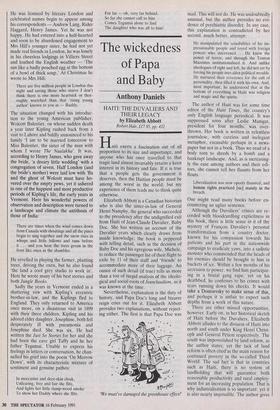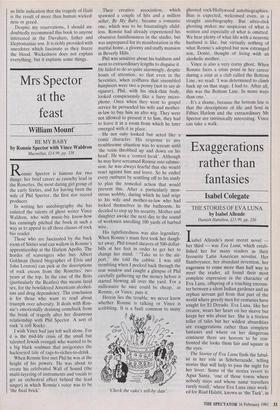The wickedness of Papa and Baby
Anthony Daniels
HAITI: THE DUVALIERS AND THEIR LEGACY by Elizabeth Abbott Robert Hale, £17.95, pp. 432 Haiti exerts a fascination out of all proportion to its size and importanpe, and anyone who has once travelled to that tragic land almost invariably retains a keen interest in its history and fate. If it is true that a people gets the government it deserves, then the Haitian people must be among the worst in the world; but my experience of them leads me to think quite otherwise.
Elizabeth Abbott is a Canadian historian who is also the sister-in-law of General Henri Namphy, the general who succeeded to the presidency after the undignified exit from Haiti of Jean-Claude Duvalier, Baby Doc. She has written an account of the Duvalier years which clearly draws from inside knowledge; the book is peppered with telling detail, such as the decision of Baby Doc and his egregious wife, Michele, to reduce the passenger list of their flight to exile by 11 of their staff and 'friends' to accommodate more of their luggage. An ounce of such detail (if true) tells us more than a ton of turgid analysis of the ideolo- gical and social roots of Jeanclaudism, as it was known at the time.
Nevertheless, explanation is the duty of history, and Papa Doe's long and bizarre reign cries out for it. Elizabeth Abbott provides two explanations, without reject- ing either. The first is that Papa Doc was 'We must've damaged the greenhouse effect!' mad. This will not do. He was undoubtedly unusual, but the author provides no evi- dence of psychiatric disorder. In any case, this explanation is contradicted by her second, much better, attempt:
He manipulated the sensibilities of his im- pressionable people and toyed with foreign powers who intervened . • He knew the power of terror, and through the Tonton Macoutes institutionalised it. And unlike ideologues of right and left, he did not err by forcing his people into alien political moulds. He nurtured their reverence for the cult of personality, then filled it with his own. And, most important, he understood that at the bottom of everything in Haiti was religion and magic and the spirits.
The author of Haiti was for some time editor of the Haiti Times, the country's only English language periodical. It was suppressed soon after Leslie Manigat, president for four months, was over- thrown. Her book is written in relentless journalese, with careless and inelegant metaphor, excusable perhaps in a news- paper but not in a book. Thus we read of a body torn to shreds by a bomb and a bankrupt landscape. And, as is increasing- ly the case among authors and their edi- tors, she cannot tell her flaunts from her flouts.
Liberalisation was now openly flaunted, and human rights practiced [sic] mainly in the breach.
One might read many books before en- countering an uglier sentence.
Although the Duvaliers' crimes are re- corded with bloodcurdling explicitness in this book, there is little sense in it of the mystery of Francois Duvalier's personal transformation from a country doctor, known for his compassion towards his patients and his part in the nationwide campaign to eradicate yaws, into a sadistic monster who commended that the heads of his enemies should be brought to him in buckets of ice. Within a few months of his accession to power, we find him participat- ing in a brutal gang rape; yet on his deathbed, he confesses to his crimes with tears running down his cheeks. It would take a Dostoevsky to make sense of this, and perhaps it is unfair to expect such depths from a work of this nature.
There are other missed opportunities, however. Early on, in her historical sketch of Haiti before the Duvaliers, Elizabeth Abbott alludes to the division of Haiti into north and south under King Henri Christ- oph and General Petion respectively. The south was impoverished by land reform, as the author states; yet the lack of land reform is often cited'as the main reason for continued poverty in the so-called Third World. The sad fact is that in countries such as Haiti, there is no system of landholding that will guarantee both reasonable productivity and rural employ- ment for an increasing population. That is why industralisation is so important: yet it is also nearly impossible. The author gives us little indication that the tragedy of Haiti is the result of more than human wicked- ness or greed.
Despite my reservations, I should un- doubtedly recommend this book to anyone interested in the Duvaliers, father and kleptomaniac son. It is richly provided with anecdotes which fascinate as they freeze the blood. Wickedness does not explain everything, but it explains some things.



















































 Previous page
Previous page